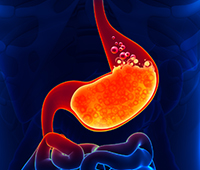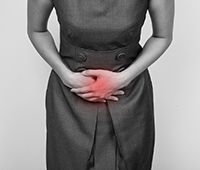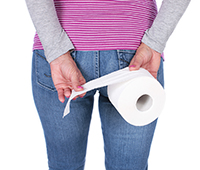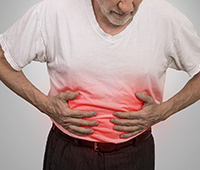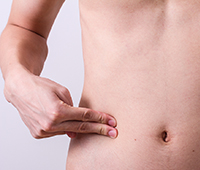WHAT IS Infantile colic
- Definition
- Causes
- Symptoms
- Diagnosis
- Ayurvedic Tips
- FAQS
- References
Definition

Infantile colic commonly refers to the excessive, frequent crying in a baby that appears to be otherwise healthy. It is a common problem that generally affects one in five infants.1
Colic usually starts when a baby is a few weeks old and normally stop by four months of age (or by six months). Having a colicky baby at home can be distressing for parents, but the problem eventually passes and is usually nothing to worry about.1
Disclaimer: The information on this page is not intended to be a substitute for professional medical advice. Do not use this information to diagnose or ayurvedic treatment of gastro-intestinal-diseases and/or infantile colic without consulting the doctor. Consult your physician before beginning an exercise regime. "While we have products /ayurvedic medicines for gastro-intestinal-diseases and/or infantile colic, you must consult an authorized physician before taking any of the products. For more information on products, visit www.dabur.com or call 1800-103-1644"
Causes
Causes OF Infantile colic
The exact cause for colic is not known, but there are many postulated to why they are caused. Some of these suggest indigestion, trapped wind, constipation or a temporary sensitivity of the child’s GI system to substances found in either the mother’s milk or packaged milk.1
Few infants may have an underlying organic disease such as lactose intolerance, anal fissures, subdural hematomas, or infantile migraine. Babies fed on cow's milk maybe suspected for cow's milk allergy.1
Colic occurs equally in both boys and girls, as well as in babies that are breastfed versus those that are bottle-fed.1
As per Ayurveda physiology, colicky pain is a result of imbalance in the function of apana vayu (energy that helps digestion of food). Apana vayu stays in intestine and governs the ability to eject or eliminate what is not needed in the system. It is also responsible for urine and stool removal from body. Therefore any change/imbalance in the function of apan vayu leads to trapped wind in the gut and causes pain.2
Disclaimer: The information on this page is not intended to be a substitute for professional medical advice. Do not use this information to diagnose or ayurvedic treatment of gastro-intestinal-diseases and/or infantile colic without consulting the doctor. Consult your physician before beginning an exercise regime. "While we have products /ayurvedic medicines for gastro-intestinal-diseases and/or infantile colic, you must consult an authorized physician before taking any of the products. For more information on products, visit www.dabur.com or call 1800-103-1644"
Symptoms
Symptoms OF Infantile colic
Signs and symptoms of colic include1:
- Intense bouts of unexplained crying
- Crying starts in the afternoon or evening and lasts long
- Baby's face being red and flushed when they cry
- Baby may tighten its fists, pull knees up to the tummy, or curve their back while crying
- Babies may appear to be in distress
Disclaimer: The information on this page is not intended to be a substitute for professional medical advice. Do not use this information to diagnose or ayurvedic treatment of gastro-intestinal-diseases and/or infantile colic without consulting the doctor. Consult your physician before beginning an exercise regime. "While we have products /ayurvedic medicines for gastro-intestinal-diseases and/or infantile colic, you must consult an authorized physician before taking any of the products. For more information on products, visit www.dabur.com or call 1800-103-1644"
Diagnosis
Diagnosis OF Infantile colic
Qualified doctors perform a physical exam to identify any possible causes for the baby's distress, such as a blockage in the intestines (intestinal obstruction). If your baby is otherwise healthy, he or she may be diagnosed with colic.1
Laboratory tests, imaging and other such diagnostic tests aren't usually needed, but they may help in excluding other serious conditions as causes. 1
Disclaimer: The information on this page is not intended to be a substitute for professional medical advice. Do not use this information to diagnose or ayurvedic treatment of gastro-intestinal-diseases and/or infantile colic without consulting the doctor. Consult your physician before beginning an exercise regime. "While we have products /ayurvedic medicines for gastro-intestinal-diseases and/or infantile colic, you must consult an authorized physician before taking any of the products. For more information on products, visit www.dabur.com or call 1800-103-1644"
Ayurvedic Tips
Ayurvedic Tips Infantile colic
Qualified doctors perform a physical exam to identify any possible causes for the baby's distress, such as a blockage in the intestines (intestinal obstruction). If your baby is otherwise healthy, he or she may be diagnosed with colic.1
Laboratory tests, imaging and other such diagnostic tests aren't usually needed, but they may help in excluding other serious conditions as causes. 1
Diet Recommendations (Aahar)
- Make sure the baby doesn't swallow air while feeding
- Burp the baby after feeding
- Don't stop breast feeding; weaning may make the colic worse
- Avoid loud noises, bright lights and noisy toys and rattles
Lifestyle changes (Vihar)
Disclaimer: The information on this page is not intended to be a substitute for professional medical advice. Do not use this information to diagnose or ayurvedic treatment of gastro-intestinal-diseases and/or infantile colic without consulting the doctor. Consult your physician before beginning an exercise regime. "While we have products /ayurvedic medicines for gastro-intestinal-diseases and/or infantile colic, you must consult an authorized physician before taking any of the products. For more information on products, visit www.dabur.com or call 1800-103-1644"
FAQS
FAQS
1. What is GERD?
Acid reflux disease - also commonly known as Gastro-esophageal reflux disease (GERD) is condition in which acid from the stomach regurgitates or moves up into the esophagus (gullet).
2. How are fissures caused?
An anal fissure may occur when due to passing of hard or large stools during a bowel movement. Anal fissures typically cause pain and bleeding with bowel movements. One may experience spasms in the ring of muscle at the end of the anus (anal sphincter).
3. Can a fissure heal completely?
With appropriate treatment and following of pathya apathya, a fissure can heal completely. Although care should be taken not to be constipated and have high amount of fiber in food.
4. What is a kshar karma? How is it different from other surgery
Kshar karma is a specialized Ayurvedic surgical procedure that involves minimal blood loss and provides excellent relief in hemorrhoids and fistulas. It involves the applying of a sclerosing agent, such as apamarg kshar snuhi kshar etc.
It differs from conventional surgery as in it does not require anaesthesia, shows minimal blood loss and need not require inpatient admissions.
5. What are the risk factors of developing bowel incontinence?
A number of factors can increase the risk of developing fecal incontinence. These include:
- Age: It is more common in middle-aged and older adults.
- Female gender: Fecal incontinence is slightly more common in women. One reason may be that fecal incontinence can be a complication of childbirth.
- Nerve damage: People who have long-standing diabetes or multiple sclerosis — conditions that can damage nerves that help control defecation — may be at risk of fecal incontinence.
- Dementia: Fecal incontinence is often present in late-stage Alzheimer's disease and dementia.
- Physical disability: Being physically disabled may make it difficult to reach a toilet in time. An injury that caused a physical disability also may cause rectal nerve damage, leading to fecal incontinence. Also, inactivity can lead to constipation, resulting in fecal incontinence.
6. What exercises can be done to have better control on the motions?
Certain asanas that help strengthen the pelvic floor (muscles around the anal opening) are recommended for better control over the anorectal area. These are -
- Utkatasana
- Virabhadrasana
- Ananda Balasana
- Shlabhasana
7. Can celiac disease lead to anything serious?
Untreated, celiac disease can cause the following complications:
- Malnutrition: The damage to your small intestine means it can't absorb enough nutrients. Malnutrition can lead to anemia and weight loss. In children, malnutrition can cause slow growth and short stature.
- Calcium loss of calcium and low bone density: Malabsorption of calcium and vitamin D may lead to a softening of the bone (osteomalacia or rickets) in children and a loss of bone density (osteoporosis) in adults.
- Infertility and miscarriage: Malabsorption of calcium and vitamin D can contribute to reproductive issues.
- Lactose intolerance: Damage to your small intestine may cause you to experience abdominal pain and diarrhea after eating lactose-containing dairy products, even though they don't contain gluten. Once your intestine has healed, you may be able to tolerate dairy products again. However, some people continue to experience lactose intolerance despite successful management of celiac disease.
- Cancer: People with celiac disease who don't maintain a gluten-free diet have a greater risk of developing several forms of cancer, including intestinal lymphoma and small bowel cancer.
- Neurological problems: Some people with celiac disease may develop neurological problems such as seizures or peripheral neuropathy (disease of the nerves that lead to the hands and feet).
In children, celiac disease can also lead to failure to thrive, delayed puberty, weight loss, irritability and dental enamel defects, anemia, arthritis, and epilepsy.
8. Who gets affected by pancreatitis?
Acute pancreatitis is more common in middle-aged and elderly people, but it can affect people of any age. Men are more likely to develop alcohol-related pancreatitis, while women are more likely to develop it as a result of gallstones.
9. What are the common causes of developing ulcers in stomach?
Common causes of peptic ulcers include -
- Long-term use of non steroidal anti-inflammatory drugs (NSAIDs)
- An infection with the bacteria Helicobacter pylori (H. pylori)
- Rare cancerous and/or noncancerous tumors in the stomach, duodenum, or pancreas
Addtionally, intake of alcohol and smoking also increase the chances of having a gastric ulcer.
10. What causes hemorrhoids?
Swelling in the anal or rectal veins causes hemorrhoids. Several factors may cause this swelling, including -
- Chronic constipation or diarrhea
- Straining during bowel movements
- Sitting on the toilet for long periods of time
- A lack of fiber in the diet
Another cause of hemorrhoids is the weakening of the connective tissue in the rectum and anus that occurs with age.
Pregnancy can cause hemorrhoids by increasing pressure in the abdomen, which may enlarge the veins in the lower rectum and anus. For most women, hemorrhoids caused by pregnancy disappear after childbirth.
Disclaimer: The information on this page is not intended to be a substitute for professional medical advice. Do not use this information to diagnose or ayurvedic treatment of gastro-intestinal-diseases and/or infantile colic without consulting the doctor. Consult your physician before beginning an exercise regime. "While we have products /ayurvedic medicines for gastro-intestinal-diseases and/or infantile colic, you must consult an authorized physician before taking any of the products. For more information on products, visit www.dabur.com or call 1800-103-1644"
References
References
- NHS Choices. Colic. Available at http://www.nhs.uk/conditions/colic/Pages/Introduction.aspx accessed on Aug 23rd 2016
- Singh AK. A Critical Review On Ayurvedic Concept Of Agnimandya (Loss Of Appetite). JPSI. Apr 2012; 1(2):5-8
- Dept of AYUSH. Infant Colic and Homoeopathic Management. Available at http://delhi.gov.in/wps/wcm/connect/9cba0c804f8084ae8a85fea5ebab3720/Infant+Colic.pdf?MOD=AJPERES&CACHEID=9cba0c804f8084ae8a85fea5ebab3720 accessed Aug 23rd 2016
Disclaimer: The information on this page is not intended to be a substitute for professional medical advice. Do not use this information to diagnose or ayurvedic treatment of gastro-intestinal-diseases and/or infantile colic without consulting the doctor. Consult your physician before beginning an exercise regime. "While we have products /ayurvedic medicines for gastro-intestinal-diseases and/or infantile colic, you must consult an authorized physician before taking any of the products. For more information on products, visit www.dabur.com or call 1800-103-1644"
Know more on Gastro Intestinal diseases
